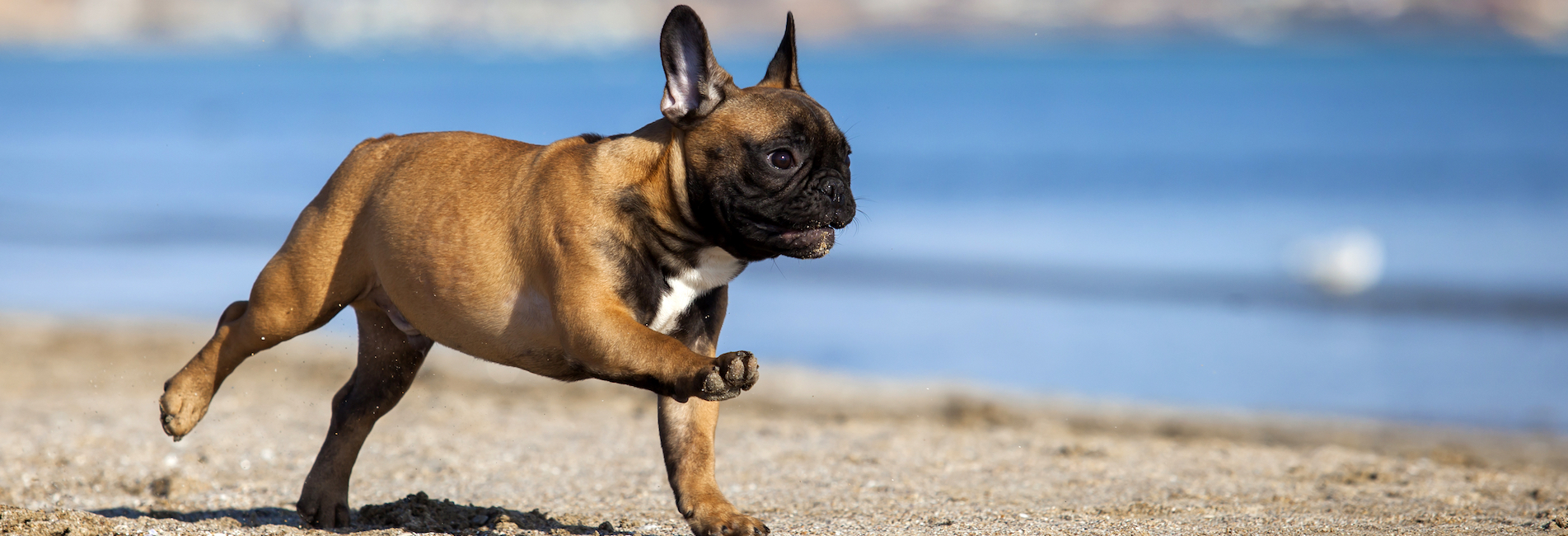French Bulldogs are both happy and curious, whilst showing a lot of affection. They make great pets for either the city or countryside, and are often great with small children. They are intelligent dogs who enjoy spending time with their owners, but they can become easily distracted.
History of the French Bulldog
Despite their name, ‘Frenchies’ do not originate from France. They are descendants of British Bulldogs. British Bulldogs were originally bred for bull baiting until the sport was outlawed in 1835. Following the ban on bull baiting, people started to breed smaller bulldogs, which became popular in parts of the UK. When the Industrial Revolution hit the British lace trade, this is where we can see their movement to France. Lace makers moved and settled in Normandy, and in doing so were joined by their miniature bulldogs. Originally, French Bulldogs had rose-shared ears, similar to the English Bulldog. However, American breeders liked the ‘bat ears’ we see today. In recent years the breed has seen a large rise in popularity. Between 2009 and 2015 the registrations for the breed increased 10 fold and in 2015 the French Bulldog was ranked third most popular breed in the UK.
Quick Facts About French Bulldogs
Size: Small.
Height: 27-30cm.
Weight: 7-12kg.
Average Lifespan: Over 10 years.
Sheds: Yes.
Exercise Required: Up to one-hour per day.
Size of Home: Flat/ Apartment.
Size of Garden: Small/ Medium garden.
Temperament: Playful, affectionate, independent.
General: French Bulldogs get along with children, the elderly and people with disabilities, and can live happily with other pets.
Getting your Dog
Tips on Getting a French Bulldog
Make sure you do lots of research before getting a French Bulldog. Once complete, and you are happy to take on the responsibility of owning a Frenchie, then there are two main options for getting your new furry friend. Rehoming centres across the country may be a place for you to find a French Bulldog. Otherwise, you can buy from a breeder.
Are French Bulldogs good pets?
Frenchies are loving dogs, known for being quite laid-back and will fit in with your family life. They can be lower maintenance as they tend to prefer a shorter walk. They were originally bred as a ‘companion’ breed, meaning they are very people orientated dogs and do not like being left alone, even for short periods. Ideally they need their owner with them all day.
Do they need much exercise?
Similar to most breeds, a French Bulldog will need regular exercise to remain healthy and stimulated. Ideally you will be walking them every morning and afternoon. However, unlike other breeds French Bulldogs do not need intense exercise. Their flat faces mean that their airways are often restricted, meaning they can develop breathing problems and overheating, particularly when in the hot weather.
Feeding Your French Bulldog
A French Bulldog diet will vary depending on their age. You will need to feed them a complete, balanced dog food to keep them slim and healthy. Your vet will be able to best advise you on how much your French Bulldog should be eating. You should look to feed them a good quality, complete dog food. It is advisable to feed your dog at the same time every day to get them into a routine, and you should leave a gap after eating and before exercising.
Grooming
French Bulldogs are fairly low maintenance with regard to grooming. They have smooth coats which should only require one thorough brush per week, and they will only need to be bathed when really dirty.
- Baths and showers tend to be the best place to bathe your French Bulldog. Put a mat down to stop them from slipping over.
- French Bulldogs can be sensitive to shampoos with a lot of chemicals or scents. Ensure you use a gentle shampoo with simple ingredients to avoid this.
- Use a face cloth or hand towel to gently wash your Border Collies face.
- Have a grooming brush or mitt to help remove any excess hair from your French Bulldog.
- Clip the nails with a nail clipper, or alternatively use a Dremel intended for dogs, to keep the nails at a short length.
- If you get back from a muddy walk, or your Frenchie has just had a run in the garden following some rainfall, have a towel to hand to wipe the feet.
Health
French Bulldogs are prone to certain health conditions. To help you be more aware and prepared for these potential problems, we list the most common health issues in French Bulldogs below.
- Respiratory system disorders - as a flat-faced breed, French Bulldogs are prone to brachycephalic obstructive airway syndrome (BOAS). This is due to their short facial structure, creating a squashing effect on the tissues at the back of the nose and in the throat. They find it hard to pant and cool themselves down, meaning in hot weather, they can overheat. Try to keep your dog inside on hot days, with moderate exercise, and using a harness rather than a collar.
- Ear disorders - germs and debris can easily enter the ear and cause infection.
- Skin allergies.
- Corneal ulcers - due to their flat face, French Bulldogs have eyes which stand more exposed on their faces to other dog types. This can lead to a greater chance of infection.
Ownership costs
The likely lifetime cost for a French Bulldog will need to be considered, and will typically include the following.
The list above does not include veterinary costs if your pet becomes sick or injured, so these average lifetime costs could be even higher.
Do they bark a lot?
Like with most dogs, a French Bulldog will make some noise. You will find some are quite vocal, whilst others can be relatively quiet - it will just come down to the individual differences between French Bulldogs. Ensuring they have enough exercise and mental stimulation to keep them occupied may help to calm them down.
Can they be left alone?
Like most dogs, French Bulldogs can be prone to separation anxiety which can manifest itself in a number of ways; from vocalisations (howling and/or barking) as soon as you leave the room, to destructive behaviour, or even toileting. Thankfully with training, most dogs can overcome separation anxiety and be trained to be left alone (more information on treating seperation anxiety in dogs can be found here).
As a general rule French Bulldogs should not be left alone, and ideally need to be in a home where someone is around all the time to keep them active and make sure they don’t get bored. Alternatives such as boarding or hiring a dog walker should be considered if that isn’t possible for your situation.
In recent years the number of Doggy Daycare providers have expanded rapidly. Whilst this can be relatively expensive, it does have the advantage of both socialising your dog with the other dogs there, and as well as providing peace of mind that your dog is being supervised for the entire day. However, if Doggy Daycare is out of your price range there are other options, such as using a dog walking service. Services such as Rover or Wag! offer skilled walkers at affordable prices. This option is appropriate when you know you’ll be gone longer than four hours. In turn, your dog will have a chance to go to the bathroom and exercise while you’re away.
Investing in a mentally stimulating toy is a great way to keep your French Bulldog separation anxiety at bay. Toys such as the ‘kong’ stuffed with food, are excellent at distracting your dog for the first 20-30 minutes when you leave.




